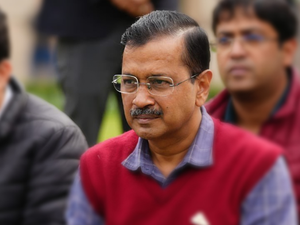ED’s claims on evidence destruction ‘baseless’, arrest ‘politically motivated’: CM Kejriwal in affidavit to SC
New Delhi: Delhi Chief Minister Arvind Kejriwal has filed a counter affidavit in the Supreme Court in response to the Enforcement Directorate’s (ED) submissions, wherein the probe agency had claimed that a total of over 170 mobile phones were changed/destroyed by accused with others during the period of alleged excise policy scam.
Kejriwal, in his affidavit, has refuted the ED’s claims of evidence destruction or disappearance concerning mobile phones, saying that there is no evidence to support such allegations against him. The AAP supremo has condemned his arrest as politically motivated, arguing that it unfairly advantages the ruling party during the ongoing elections, compromising the principle of ‘free and fair elections.’
He labelled the ED’s claims of “large-scale destruction of evidence” as baseless and devoid of merit, calling them as a desperate attempt to rationalise his unlawful arrest.
The CM has criticised the ED’s conduct, accusing them of high-handedness and a disregard for due process.
The AAP leader portrayed the case as a prime example of the central government’s misuse of agencies like the ED to suppress political opponents. He reiterated his stance that the ED’s actions were part of a concerted effort to undermine the Aam Aadmi Party (AAP) and its leaders.
In the last hearing, the top court had issued notice to ED and had ordered Kejriwal’s special leave petition to be listed in the week commencing April 29 for further hearing.
The apex court had asked the federal anti-money laundering agency to file its reply by April 24 and allowed the petitioner side to file a rejoinder affidavit, if any, by April 27.
The affidavit filed by ED’s Deputy Director said that Kejriwal’s petition was devoid of merit and his arrest was necessitated due to his “total non-co-operative attitude”.
The affidavit said that Kejriwal was avoiding interrogation by not remaining present before the investigating officer despite being summoned nine times and while recording his statement under section 17 of the PMLA he was avoiding answering questions by being evasive and totally non-cooperative.
CM Kejriwal has approached the Supreme Court challenging the dismissal of his plea by the Delhi High Court.
Earlier, a bench of Justice Swarana Kanta Sharma of the Delhi High Court took note of the ED’s submission that the federal anti-money laundering agency had enough material, including statements from approvers and allegations of involvement in the formulation of the excise policy, which had led them to arrest him.
The ED has denied that the arrest of Kejriwal in the Delhi excise policy case was based on belated contradictory or coerced statements of the other accused obtained in exchange for no objection for their bail and said that its case was strong.
The ED, in its affidavit, claimed that CM Kejriwal had made submission before the Delhi PMLA court, stating that he had no objection to the custody/remand being extended further.
“The petitioner has waived his right to question his custody as of today and the petitioner cannot be allowed to argue that his custody as of today is illegal and the present petition is liable to be dismissed on this ground alone,” read the ED’s affidavit.
The agency also claimed that CM Kejriwal was asked to provide the password of his mobile phones during the search on March 21 and then during ED Custody the same was asked again and his reply was recorded in his statement wherein he refused to share the same.
“Even his statements during custody would reveal that despite being confronted with materials, the petitioner chose to give completely evasive answers,” it added.
The ED arrested CM Kejriwal on March 21 after questioning him for over two hours at his official residence in Delhi and is presently lodged in Tihar jail.
The ED has termed CM Kejriwal the “kingpin and the key conspirator” of the alleged excise scam in collusion with other ministers of the Delhi government, AAP leaders, and other persons.
–IANS


Comments are closed.